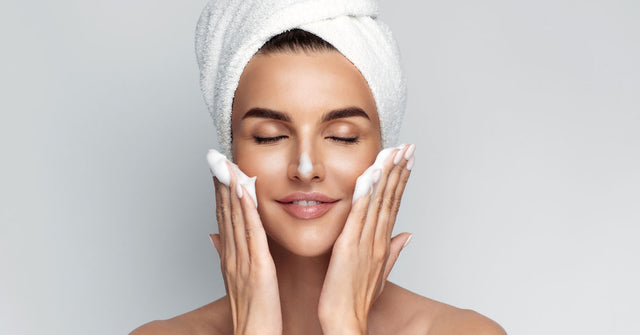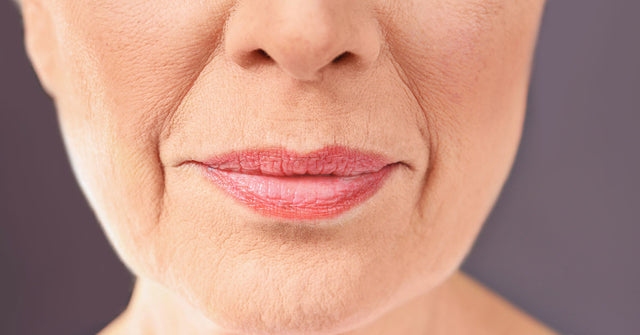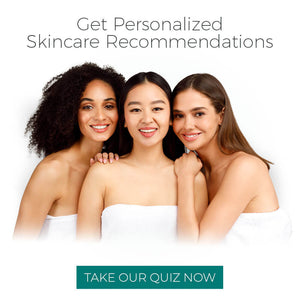As much as we’d like things to be different, adults aren’t immune to acne. They can appear anywhere on the face, including the forehead. Sure, seeing acne on the face is the last thing you want, but all is not lost. Why is my forehead breaking out, though? That’s the main focus of this article. Read on to learn why acne develops on the forehead and what you can do about it.
What Is Adult Acne?
Adult acne is a type of acne that develops after the age of 25. Another term for this skin problem is post-adolescent acne. People can continue developing acne throughout their 30s and 40s. It’s also possible for a person to get acne in their 50s, the American Academy of Dermatology confirms [1].
Adult acne is quite common. A survey [2] of 1013 men and women showed that 50.9% of 20-to-29-year-olds had this type of acne. Prevalence of acne in participants who were in their 30s was 35.2% while 26.3% of people in their 40s had acne. Adult acne can affect any part of the face. But “why is my forehead breaking out?”, you might wonder. Find out below.
Adult Acne Vs. Teenage Acne
Adult acne affects women primarily, but teenage acne is more common in boys. The biggest cause of teenage acne is hormonal imbalance, mainly concerning testosterone. Adult acne can also result from hormones, but factors such as genetics are also involved. Teens tend to develop acne on the cheeks and forehead, but adults get acne on the chin and around the mouth. Sometimes adults can get acne on their foreheads, too.
Adolescents have more blackheads and whiteheads than adults do. Adults recover slower from acne breakouts than teens. That happens because teens have a faster cell turnover and their skin is more resilient.
How Long Does Forehead Acne Last?
Forehead Acne lasts between three to seven days in the best scenario. However, it may take between one and two weeks for them to go away. That’s how long acne usually lasts. Some acne lasts up to six weeks. It’s important to adopt a proper acne skincare routine so that pimples go away quickly, without scarring. Forehead acne may last longer if you keep touching them with your fingers or neglect the importance of a well-structured skincare regimen.
Forehead Acne: Can It Be A Health Condition?
Forehead acne isn’t a serious health condition. Even though acne on the forehead can be an uncomfortable and frustrating problem, it’s not a health risk. Zits and pimples aren’t dangerous.
While forehead acne isn’t a health problem, it can be a consequence of some health conditions. A good example is an unhealthy gut like in people with irritable bowel syndrome (IBS). Studies show [3] that IBS is more common in people with acne than in individuals who don’t have this skin problem. Digestive issues can worsen acne because the body isn’t removing waste properly. Toxins and waste products are forced to leave the body differently. These factors can contribute to acne.
What Are The Different Types Of Forehead Acne?
Not all zits and pimples on the forehead are the same. Different types of forehead acne are listed below:
-
Comedones: Comedones develop when dead skin cells and excess sebum (oil) block the oil-producing glands in the skin. This type gives the skin a bumpy appearance. Some comedones are closed (whiteheads) and others are open (blackheads). Blackheads develop when the oil plug is near the opening of a pore. Whiteheads form when the oil plug is below the opening of the hair follicle. Fortunately, with a proper routine that includes powerful products like Zeroblem Anti-Acne Serum, these pimples and blemishes can heal quickly.
-
Pustules and papules: Pustules are pus-filled bumps while papules are inflamed blemishes known as pimples or zits. Pustules have yellow or white pus-filled tips. Papules don’t have pus, they are solid. Papules can become pustules. Both papules and pustules are inflammatory acne.
-
Milia: These are small white cysts on the face which are also known as milk spots. Milia usually affects infants, but people can develop them at any age. Milk spots appear in groups or clusters. They don’t cause pain or discomfort, though. Trapped dead skin cells are the main cause of milia.
Why Is My Forehead Breaking Out?
There is no single answer to a question such as “Why is my forehead breaking out?” Many causes lead to pimples and zits on your forehead. The most common causes include:
-
Hormonal imbalance: Fluctuations in hormones can cause acne to develop. These imbalances happen during menstrual cycle, pregnancy, or menopause. For example, low levels of estrogen can increase androgen levels [4] (testosterone) and lead to acne breakouts.
-
Emotional stress: This triggers or worsens acne by causing hormonal imbalance. Emotional stress increases cortisol levels. Skin oil production may then increase and lead to acne on the forehead.
-
Blocked pores: Buildup of dead skin cells, oil, dirt, and other impurities clogs pores. Blocked pores can lead to acne, especially in the absence of an acne skincare routine. Sometimes, clogged pores become inflamed, which can also cause acne.
-
Pollution/staying too long in the sun: Pollution causes acne because the skin is exposed to dust, debris, and dirt. These can block pores and cause acne on your face, including the forehead. Exposure to the sun dries out the skin. As a response to that situation, sebaceous glands go into overdrive. They start producing more sebum, which can lead to acne.
-
Overwashing your face: This habit removes natural oils, thereby forcing the sebaceous glands to keep producing more sebum. This paves the way for acne. If you’re wondering “Why is my forehead breaking out?”, the culprit could be a habit of over-cleansing.
-
Not washing your hair enough/dandruff: Excess oil from your hair can reach the forehead. Dandruff can clog pores. Both problems can contribute to forehead acne due to excessive oil production.
-
Dirty pillowcases: They retain dirt, bacteria, and allergens. All these factors can lead to excessive oil production and clogged pores. In the end, forehead acne shows up.
-
Tight clothing: Tight clothing creates a warm and moist environment where bacteria thrive. This can lead to acne [5]. Good examples are headbands and scarves.
-
Using the wrong skincare products or a hair care product: The wrong skincare or hair care products can irritate the skin and make it more prone to acne. Sensitive skin type is more susceptible to this problem.
-
Sweat: It creates a fertile ground for bacteria, especially in combination with dirt and oil. Sweat causes acne when it stays on the skin’s surface. That’s why proper cleansing is one of several ways to stop a pimple from forming.
How To Avoid The Forehead Acne?
So, how to stop acne from forming? These tips will help you out:
-
Keep the hair away from the forehead: Since hair can introduce more sebum to the forehead skin, the best thing to do is to keep it away. Use a hair tie to pull hair away from your skin. Avoid wearing tight headbands. Also, make sure to wash your hair regularly.
-
Clean face: Regular cleaning removes excess oil and impurities from the skin. Add a gentle cleanser to your acne skincare routine so it doesn’t irritate your skin. Cleanse your face twice a day (morning and night).
-
Moisturize regularly: This prevents skin from becoming dry and irritated. That way, sebaceous glands don’t go into overdrive. Choose moisturizers with a light formula that won’t clog your pores. Water-based moisturizers are most suitable for acne-prone skin.
-
Chemical peels: Products like the Glowpeel Dermal Resurfacing Peel remove dead skin cells and encourage cellular turnover and collagen production.
-
Exfoliate regularly: This removes dead skin cells and eliminates excess oil on the face to keep the pores clear.
-
Use sun protection: Ingredients found in sunscreen exhibit anti-inflammatory effects. They can reduce inflammation and relieve acne. Products like the Dermaxsol Hydrating SPF protection prevent the sun’s rays from damaging the skin and causing acne.
-
Improve your diet: An unhealthy diet can worsen acne by encouraging sebum production. Eat fruits, vegetables, nuts and seeds, and healthy fats. If you want to know how to stop acne from forming, make sure to avoid refined grains sugars, and fast food.
How Do I Know If I’m Worsening My Skin Condition?
You may keep on wondering “Why is my forehead breaking out?”, but you aren’t sure what is making things worse. You’re worsening your skin condition [6] if you keep repeating these habits:
- Trying new acne treatments every week
- Keep on using skincare or hair products and cosmetics that cause acne
- Applying acne medication on blemishes only
- Sharing makeup, brushes, applicators, etc., with other people
- Going to bed without removing makeup
- Excessive washing of your face throughout the day
- Using harsh products in your acne skincare routine
- Scrubbing your skin
- Using a towel to rub the sweat from the skin
- Popping pimples
Frequently asked questions
Is It Safe To Pop A Pimple On Your Forehead?
Popping a pimple on your forehead is not safe. Doing so increases the risk of infection and scarring. When you pop a pimple or acne on the forehead, you break the skin barrier. The risk of permanent scarring increases that way.
Plus, if your pimple contains pus, popping it with your fingers spreads bacteria into other hair follicles and pores. This increases the risk of infection and may cause or worsen acne breakouts. The body’s natural healing process is delayed when you pop a pimple [7] yourself. Sometimes, a person unsuccessfully attempts to pop a pimple on their forehead. As they keep doing that, the contents of the pimple are pushed underneath, thereby clogging the pores even more.
Why Do I Have Acne On My Forehead And Not My Entire Face?
You have acne on your forehead and not on your entire face due to several factors such as stress, hormones, and irritation caused by hair products. If you don’t wash your hair regularly, the oils may transfer to your forehead and cause acne. This can happen if your hair tends to get greasy quickly. For that reason, the answer to the question, “Why is my forehead breaking out?” has multiple answers. A combination of different factors could be involved.
What Deficiency Causes Forehead Acne?
Deficiency of vitamins A, E, and D, and mineral zinc can all cause forehead acne. In a study [8] from Cutaneous and Ocular Toxicology, low levels of vitamins A and E, and mineral zinc were associated with acne. Evidence shows that vitamin D levels are lower in people with acne [9] compared to people who don’t have this skin problem. Certain vitamins and minerals can protect the skin against acne-causing bacteria. If you’re looking for an easy way to stop pimples from forming, make sure to modify your diet.
Conclusion
This post focused on answering the question, “Why is my forehead breaking out?”, and explained other factors revolving around this topic. Adults can have forehead acne too. Thankfully, this problem is treatable. With a few simple lifestyle tweaks, you can eliminate acne.
References
1] ↑ https://www.aad.org/public/diseases/acne/really-acne/adult-acne
2] ↑ https://www.ncbi.nlm.nih.gov/pmc/articles/PMC5788264/
3] ↑ https://pubmed.ncbi.nlm.nih.gov/32463985/
4] ↑ https://www.ncbi.nlm.nih.gov/pmc/articles/PMC5300732/
5] ↑ https://www.byrdie.com/what-causes-forehead-acne-4844912
6] ↑ https://www.aad.org/public/diseases/acne/skin-care/habits-stop
7] ↑ https://www.healthline.com/health/beauty-skin-care/should-you-pop-a-pimple#should-you-pop
8] ↑ https://pubmed.ncbi.nlm.nih.gov/23826827/
9] ↑ https://journals.plos.org/plosone/article?id=10.1371/journal.pone.0161162
Mentioned in this article
More stories

Facial Cleansers - A Vital Component to Improve Skin's Health





